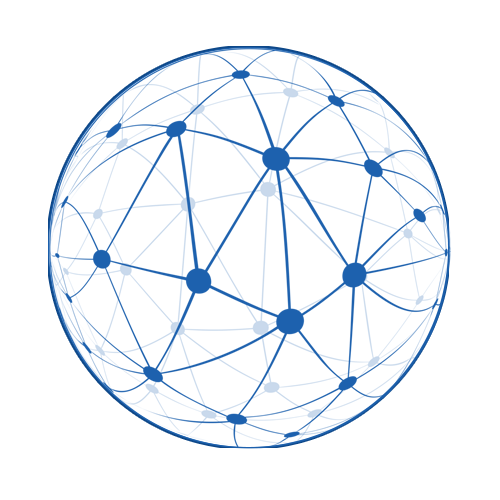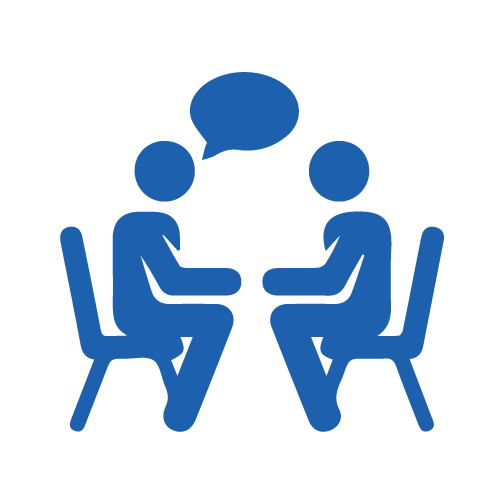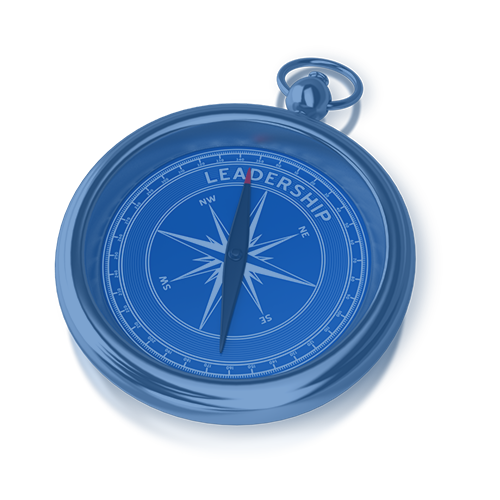Mussio La Grassa Courses

Anti-racism, Diversity, Inclusion and Belonging
Leading and managing a diverse group of employees with principles of inclusion is the backbone of a successful organization. Employees who feel they are included and belong are more engaged, productive and have higher retention rates. In this half-day course participants learn and practice anti-racism, accessibility, diversity and inclusion strategies to help them nurture a work environment where all individuals feel supported, valued and respected.

Art of Public Speaking
Public speaking is one of the most common fears people have at all levels in an organization. Gain skills, tools and strategies to become a comfortable and confident speaker in this interactive half-day course. From establishing a connection to your audience, to organizing content and conveying messages with impact, you will acquire and apply public speaking techniques to engage a range of audiences.
Briefing Materials
Leadership teams including ministers, senior executives, deputy ministers, and managers are required to respond quickly and effectively to complex and ever-changing issues – both internally and externally. Briefing materials provide a structured effective way to funnel information in a consistent, responsible format that identifies key messages. The briefing note synthesizes all the information and considerations the decision maker needs to be aware of when communicating. The ideal briefing note is succinct and easy to understand. Participants examine various types of briefing notes, elements of responsibility, accountability and liability, formatting and structure, and the required writing skills for each part of a note. Participants engage in a variety of learning activities and apply a variety of skills and strategies to prepare and deliver clear, concise briefing notes that can be used effectively by senior leaders.

Business Case Development
Create effective and persuasive business cases. Learn to use a new, transformative approach to researching, conceptualizing, writing and delivering persuasive and influential business cases. Create viable options and apply business analysis, due diligence and risk mitigation techniques. Learn the process for transitioning from concept to reality.

Business Communications
Being able to write clear, accurate and effective business documents contributes to good, timely decision-making. Staff at all levels need good business communications skills to keep an organization well-oiled and productive. Be able to reach multiple audiences using data and visuals in reports, business cases, financial documents, proposals and white papers. Learn how to prepare oral presentations to maximize key messages to achieve understanding and corporate alignment is a modern core skill in any organization.
Clear Writing and Plain Language
Have you ever received a work email that you received and said, “What does that mean?” Or memos or lists that were just plain confusing? Banish misunderstanding with our Clear Writing workshop. Clear communication is an essential business practice, both internally and externally. Clear writing facilitates not only quick and efficient decision-making but good client relations. As such, clear writing can impact the bottom line. In this engaging workshop, participants will learn the principles of plain language and how they work to make writing clearer. With hands-on guidance, participants will practise strategies to help them write what they mean to say and be easily understood.

Conflict Management Skills
Explore the seven paradoxes of conflict and delve into the dynamics of cooperation, competition and conflict. Learn and apply the tools, techniques and models through the three stages of conflict. Find out your Individual Conflict Mode Inventory Score by taking the Thomas-Kilmann Self-Assessment (TKI).

Consulting Skills
Knowing how to develop, negotiate expectations, follow-through and evaluate are key to successful consulting engagements. Being able to discern root causes of issues, build relationships, communicate and report are essential tools when consulting. The consulting tool kit will equip you with critical thinking, decision-making and change realization skills to lead and manage consulting engagements.

Critical Thinking, Problem Solving and Decision-Making
Develop your own personal toolkit to bring clarity to your critical thinking. Learn to detect hidden assumptions, spot inconsistencies and detect logical and illogical reasoning. Develop skills to ask the right questions to uncover the truth behind words, events, and opinions to problem solve. Gain the ability to be objective and rational without emotions affecting your judgement and decision-making.
Editing and Proofreading
Your credibility is often reflected in the credibility of your work. Spelling, grammar, and unintended messages are more than distractions – they compromise you and the credibility of your abilities. Sometimes we are caught up in what we want to say that we forget that how we say it is equally important. Learn the four C’s of editing – correctness, clarity, conciseness and consistency – and how to proofread your own work. Also, learn the best practices for on-line editing.

Emotional Wisdom
Explore the model for Emotional Intelligence Composites and Subscales and how they contribute and impact your performance and productivity on the job. Engage in experiential self-awareness with multiple reflections in large and small groups. Become equipped to transform how you interact with others.

Evidence-Based Writing
Presenting evidence without bias, opinion or perspective is a learned skill. Being able to write impartial evidence-based content requires being able to discern the difference between writing the facts and spinning the edges of fact into fiction. Investigators, officers, inspectors, compliance personnel, standards examiners among others learn to transition for using jargon, dense specialized language into using plain language that maintains accuracy without compromising complexity. Being able to recognize editorialized content and learn techniques to avoid editorializing is key to evidence-based writing.

Human-Centred Design Thinking
Learn the fundamentals of design thinking. Gain insight into a user-centered approach to problem-solving that combines creative and analytical methods to generate innovative solutions. Participants will learn the five stages of design thinking and dive into framing problems, brainstorming innovative ideas, creating prototypes, and testing solutions in iterative cycles.

Integrated Marketing
Being able to understand your market, the people who buy your products or use your services is as important as having products or services. Be able to analyzie consumer segmentation, psychographics and demographics to make informed decisions. Learn how to select and engage in multi-channel marketing, assess emerging trends and interact effectively on social media platforms with real-time impacts. Learn the five stages of a campaign and how to write effective media briefs and creative briefs.

Issues Management
Knowing how to discern an issue in a circumstance gives you a leadership role in managing the issue. Being able to align the issue with your organization’s mandate gives you insight into understanding your role and responsibility in the circumstance. Learn best practices for anticipating and managing issues. Learn the path of an issue from “engagement to crisis” and how to recognize when and how to avoid a crisis.

Leadership Challenge Workshop
Working with leadership teams to identify and develop feasible opportunities for internal efficiencies or new lines of business that align with corporate values and strategic direction. The leadership challenge is designed and customized to innovate significant growth for the company.

Management and Leadership Development
Building engaging teams aligned with organizational goals starts with effective leadership. Learning components include building effective teams; managing the dynamics of teams; effective listening; communication skills and being an authentic leader and coach. Individual coaching is incorporated to enhance leadership capabilities.

Media Training
Subject-experts and leaders such as on-site managers, engineers, police personnel, program managers and social workers, can be asked to do a planned or impromptu media interview. This can feel overwhelming for even the most confident person. Common fears and concerns centre on knowing how much to say, saying the wrong thing, being misquoted, and staying on message in the face of aggressive questioning and angry citizens. Participants learn eight media interview techniques and best practices. Whether the camera is rolling, the microphone or recorder is on; or the reporter’s pen is tapping, participants learn to stay focused on their messaging and lead the conversation. Participants learn tools and techniques to feel confident and apply them to on-camera interviews with immediate feedback.

Modern Leadership Communications
Improve how you give and receive instructions. Further develop and maintain trusting and trustworthy relationships by applying modern leadership communications practices. Increase your ability to lead using six different ways to influence. Ramp up your leadership by applying a formula for setting clear, realistic expectations.

Organizational Effectiveness
Organizational culture influences strategy implementation and operational effectiveness. Participants learn tools, techniques and skills for organizational effectiveness including organization design, decision-making processes, employee engagement, change management, team performance and accountability, work processes and leadership accountabilities.

People Management
Managing people can be the most rewarding and most challenging part of our management responsibilities. This workshop delves into people management best-practices and proven techniques. Learn to lead people by understanding the employee lifecycle: recruiting, hiring, onboarding, performance management and behaviour coaching. Participants will engage in real-life scenarios and case studies to put their learning immediately into practice. Learners will gain a results-focused action plan to successfully manage people.

Performance Reviews
What are the success factors for an effective performance review? Having tools to guide and support your performance review helps you to provide constructive, supportive and feedback through a coaching model. Being able to use, understand and apply the Performance Review Checklist for best practices will leave you comfortable with the process and ensure your performance reviews translate into results.

Personal Effectiveness
Learn how to take your personal effectiveness to the next level. Participants examine the combination of skills that help them live effectively, manage their lives, build relationships, and shape their environment. This combination of skills can be different for different people. Participants engage in honest and constructive self-reflection and an approach to enhancing their personal performance.
Assessments available.
Coaching available.

Policy Development
Learn how to take your personal effectiveness to the next level. Participants examine the combination of skills that help them live effectively, manage their lives, build relationships, and shape their environment. This combination of skills can be different for different people. Participants engage in honest and constructive self-reflection and an approach to enhancing their personal performance.
Assessments available.
Coaching available.

Preparing and Presenting Briefing Decks
Practice the Seven (7) Keys for Preparing Briefing Decks. Apply the briefing structure to briefing decks and enhance them using the visuals for effective presentations. Explore how to discern multiple audiences, the main message and the importance of using plain language.

Presentation Skills
Preparing and presenting to small or large groups can be daunting. Removing the “nice-to-know” from the “need-to-know” information for each audience, including one-on-one presentations can make or break a program, product or service initiative or decision. Gain confidence by learning to project comfortably. Learn techniques for designing your presentations so they are engaging and informative. Learn to deliver short, to-the-point presentations that are visually appealing, sensitive and audience-friendly.

Project Management
Gain general knowledge on Project Management key practices, planning, organizing and executing to achieve the project objectives on-time and on-budget. Woven into the course are the skills, tools techniques that are used to support, manage and oversee the delivery of a project to set expectations.

Public Private Partnership (P3) Projects and Public Sector Partner Leadership
P3s are now a common way of making investments in critical services that impact our overall quality of life. This course explores key leadership considerations with a focus on identifying and protecting the public interest, for public sector project partners in asset and infrastructure development or renewal. Participants gain knowledge, awareness and skills to navigate governance, accountability, project team leadership, community and stakeholder relations, risk identification and mitigation, communications and issues management. They will examine the complexities and lessons learned drawn from recent and major P3 initiatives.
Report Writing
Reports synthesize complex information and communicate it in an organized, easy-to-understand, timely manner. More is less. Participants learn essential tools for demonstrating knowledge, accountability, analysis, finances, actions and decision points in reports. But is anyone reading your report? Different internal and external audiences require different reports to achieve different communications and corporate objectives. Whether a compliance report or progress report, this interactive workshop helps participants identify what is needed, how to structure it and how to write it simply, succinctly and effectively. They learn and apply best practices, including the principles of clear writing.

Reputation Management
An organization’s reputation is a vital asset, but one that can be challenging to understand and manage. Numerous factors, such as products, service, values, process, trust, and goodwill, contribute to how an organization is perceived. Unfortunately, none of these factors are static. Our workshop helps you understand their interplay and how they apply to your company. We show you how to understand and measure reputation, who the key players in your company are, and how to identify and ward off threats. What people believe about your company matters: it drives the organization’s performance, and it should drive its activities.

Service Excellence
Learn why service excellence matters to your company’s sustainability. Defining and delivering Service Excellence is essential to your organizations continued success. Learn the ingredients to enabling and empowering your teams to continuously meet and exceed service excellence. Whether your clients are external or internal, public, or private sector, service excellence leads to increased engagement and loyalty.
Speechwriting
Having situational acumen combined with the skills and foresight to tailor engaging speeches is the job of a speechwriter. No easy feat but well worth the effort when the speaker delivers the speech to enthusiastic applause. Participants learn tools, techniques and best practices for writing speeches. They practice messaging, speechwriting skills, thinking strategies and a methodology for keeping speechwriting fresh – with or without input from the speaker.

Stakeholder and Public Engagement
Having engaged stakeholders and the public is essential for success in any organization or company. Being able to design a stakeholder and public engagement plan is the first step strategic engagement. Being able to establish and maintain these relationships is where organizations and companies need a complete set of professional engagement skills. Once these relationships are firmly in place learn a seven-step strategy for long-term positive stakeholder and public management.

Strategic Planning
Progress in organizations is often based on strategic planning and the built-in milestones and accountabilities. Having a strategic planning toolbox will ensure all departments understand their role, responsibility, and impact on the organization’s strategic direction. Understanding financial considerations and strategic planning processes will contribute to better, timely decision-making and greater corporate success.

Team Building
Tools, strategies and collaboration techniques are woven together to improve team engagement and performance. Build stronger teams while reflecting on your team vision purpose. Establishing relationships that foster trust, accountability, open communications and safe environments lead to better individual and team decisions.

Two-Minute Briefings
Learn to communicate the heart of your message in two minutes or less. Be able to synthesize your main point in one sentence. These are key skills for communication amongst and between staff to keep accurate, clear, timely information flowing throughout an organization. Understand, learn and apply fundamental skills and strategies for effective two-minute briefings.

Understanding Government
Shed some light and understanding on the why and how of federal, provincial, municipal governments and crown agencies in Canada. Recognizing and anticipating the impact of government decisions and governing bodies on your private, public or non-profit organization are essential.

Verbal Communications
Being clear and sensitive when speaking with our colleagues, family and friends isn’t always as easy as it seems. Being clear and concise can take the guesswork out of communications and create efficiencies while saving time and money at home and at work. Uncovering solutions to your communication challenges, learning to be assertive and improving your active listening skills are some of the skills you’ll walk away with from this course.












